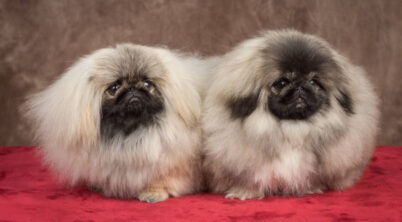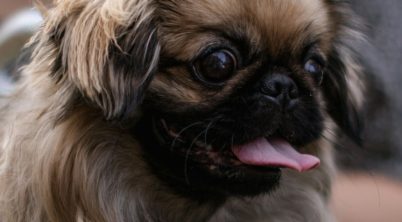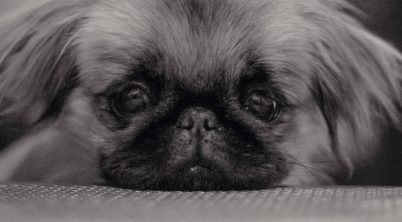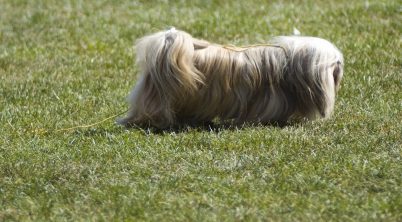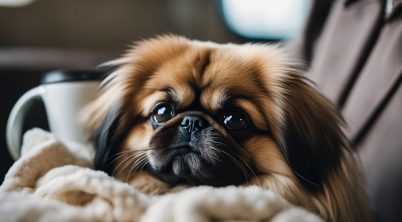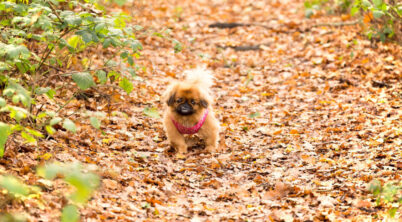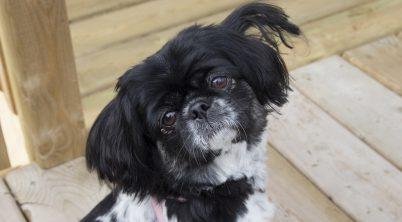The Pekingese dog, with its long, luxurious coat and distinctly noble demeanor, has a storied history hailing from the imperial courts of ancient China. This toy breed is characterized by its confident and regal bearing, a testament to its centuries-old lineage as a favored pet among Chinese royalty. Despite its royal connections and small stature, the Pekingese is not a hypoallergenic breed. They shed a considerable amount, which can be problematic for individuals with allergies.
While the Pekingese’s dense double coat is visually striking, it also produces a fair amount of dander, the common cause of allergic reactions in sensitive individuals. Contrary to some beliefs, no dog is completely hypoallergenic, but certain breeds produce fewer allergens than others. The Pekingese does not fall into this category, making them a less than ideal choice for allergy sufferers. However, regular grooming and proper care can manage shedding and potentially reduce the amount of dander present in the environment.
It is crucial for prospective Pekingese owners to consider the implications of bringing such a breed into their home, especially when allergies are a concern. While they are loving and loyal companions, the reality of owning a Pekingese may include managing a higher level of allergens. It’s advisable to spend time with a Pekingese before deciding to own one to ensure compatibility, particularly for individuals with known sensitivities to pet dander.
Table of Contents
Pekingese Hypoallergenic
Pekingese dogs are often admired for their distinctive, lion-like appearance and compact size. However, potential owners with allergies should be aware that Pekingese are not hypoallergenic. They possess a double coat, consisting of a soft undercoat and a longer outer coat, which is prone to shedding. The presence of this double layer means they can produce more allergenic dander compared to breeds with single coats.
Despite the common misconception, there are no dog breeds that are completely hypoallergenic. The allergy-triggering proteins found in dander, saliva, and urine can be present in any breed. In the case of the Pekingese, these proteins are shed along with the fur, dispersing allergens into the environment.
Managing Allergies with Pekingese Dogs:
- Grooming: Regular brushing reduces the amount of hair and dander shed. Pekingese should be brushed multiple times per week.
- Cleaning: Frequent vacuuming of the house and washing of the dog’s bedding can reduce allergen accumulation.
- Air Filters: HEPA air purifiers can help to remove dander from indoor air.
For individuals with allergies, interaction with a Pekingese should be conducted with caution, and it’s advisable to spend time with the breed before deciding on ownership. While Pekingese are not suitable for those with severe allergies, routine cleanliness and grooming practices can help manage mild to moderate allergies.
Hypoallergenic Potential
In assessing whether Pekingese dogs fit the hypoallergenic category, it’s essential to understand what hypoallergenicity means and how these dogs produce allergens.
Understanding Hypoallergenicity
The term hypoallergenic refers to the lower potential to provoke allergic reactions in sensitive individuals. It is commonly misunderstood that hypoallergenic means allergen-free, which is not the case; rather, hypoallergenic pets produce fewer allergens than others. Two primary sources contribute to allergies: shedding of fur and production of dander, which is tiny flakes of skin. Additionally, certain proteins found in a dog’s saliva, urine, and sweat can also cause allergic reactions when they bind to the dander and fur.
Pekingese and Allergens
Pekingese dogs possess a double coat consisting of a soft undercoat and a longer outer coat. They are known for their heavy shedding, especially during seasonal changes. Here’s how this breed impacts allergen levels:
- Fur: The frequent shedding of their long fur can distribute allergens around the home environment.
- Dander: Pekingese produce dander, and due to their dense fur, dander gets trapped and spreads when they shed.
- Protein Allergens: Proteins that trigger allergic reactions are present in their saliva and can be transferred to their fur during grooming.
Individuals who are allergy-sensitive may experience discomfort due to the Pekingese’s shedding and dander distribution, making them less suitable for those with severe allergic reactions. Regular grooming can help manage shedding but may not sufficiently reduce the potential for allergens to cause discomfort in those with allergies.
Temperament and Behavior
The Pekingese dog exhibits a regal and confident demeanor, often described as lion-like. This toy breed is inherently affectionate with its family, showing a deep sense of loyalty to its primary caregiver.
- Temperament: They are known for their opinionated personality, unafraid to communicate their likes and dislikes. Despite their small stature, Pekingeses carry themselves with a dignified and regal poise, often displaying a calm and composed temperament.
- Behavioral Traits:
- Affectionate: Forms strong bonds and can be very loving with their chosen person.
- Alert: Demonstrates high levels of alertness, making them reliable watchdogs.
- Charming: Their engaging personalities often endear them to those they interact with.
- Opinionated: Might be somewhat stubborn and independent, presenting a challenge in training if not handled with consistency and patience.
They may grow particularly attached to one member of the household, showing a marked preference and loyalty. This breed thrives on attention and does not take well to being ignored or left alone for extended periods. While they are not typically aggressive, their alert nature makes them excellent watchdogs, as they are quick to sound the alarm at the presence of strangers.
Socialization from a young age is crucial for the Pekingese to develop a well-rounded demeanor. It is important to respect their boundaries, understanding that while they are charming and affectionate, they also appreciate their independence.
Care and Maintenance
When caring for a Pekingese, grooming is paramount due to their long, double coat that is prone to shedding. Regular brushing, at least three times a week, is necessary to remove loose hair and prevent matting. They should also be bathed monthly with dog-specific shampoo to keep their coat clean.
The Pekingese’s diet should include high-quality, nutrient-rich food appropriate to their age and size. Their nutrition needs to consist of a good balance of proteins, fruits, and vegetables. Owners must measure their dog’s food and monitor their weight as this breed can easily become overweight.
In terms of exercise, Pekingese require less than more active breeds. Short daily walks or play sessions will suffice. However, due to their short snouts, they should be monitored for breathing difficulties, particularly in hot or humid weather. Exercise is crucial for their overall health but should be done thoughtfully.
Lastly, maintenance includes regular vet check-ups, staying up-to-date with vaccinations, and monitoring for common health issues, such as respiratory problems or eye issues, which are prevalent in this breed. Caring for a Pekingese’s health also involves dental hygiene practices like teeth brushing or providing dental chews to avoid dental disease.
By following these care and maintenance guidelines, a Pekingese’s health and happiness can be maintained effectively.
Living with a Pekingese
Living with a Pekingese can be a delightful experience, but it does require thoughtful management, especially regarding their tendency to shed and the need for regular activity. Addressing allergies and understanding exercise requirements can help create a harmonious environment for both the dog and its owners.
Managing Allergies in Homes
Pekingese are not hypoallergenic; they have a long, fluffy coat which sheds frequently, particularly during shedding season. Prospective owners with allergies should consider several strategies to minimize the impact:
- Regular Grooming: Brushing the Pekingese several times a week reduces loose fur and allergens in the home.
- Air Purifiers: Utilizing HEPA filters can help remove pet dander and other allergens from the air.
- Vacuuming: Frequent vacuuming, especially with a vacuum designed to pick up pet hair, is essential for removing fur and dander from flooring and furniture.
- Clean Furniture: Using washable covers on furniture and avoiding fabric that captures pet hair will make it easier to manage allergens.
Exercise and Activity Needs
Though Pekingese have modest exercise needs, they require regular physical activity to maintain their health.
- Daily Walks: A daily walk tailored to their pace is crucial to keep them active and manage weight.
- Playtime: Engaging in play helps ensure they get enough exercise and mental stimulation.
- Avoid Overexertion: Due to their short snout, owners should monitor their Pekingese for signs of overexertion, particularly in hot weather.
By managing allergens and ensuring that their physical activity needs are met, owners can enjoy the unique companionship of a Pekingese.
Choosing the Right Dog
When selecting a dog, prospective owners must consider the breed’s traits and their own lifestyle needs. This includes evaluating hypoallergenic qualities for those with allergies.
Comparing Dog Breeds
Hypoallergenic Breeds: Individuals with allergies often seek hypoallergenic dogs that shed minimally, reducing the presence of dander.
- Shih Tzu: This breed has hair that grows continuously, similar to human hair, shedding less.
- Bichon Frise: Known for its curly coat that traps dander, requiring regular grooming.
- Maltese: Possesses a silky single coat that sheds little and is often recommended for allergy sufferers.
- Yorkshire Terrier: Their fine, straight hair is comparable to human hair, leading to lower shedding and dander dissemination.
Considering a Pekingese
The Pekingese dog, with its long, double-coated fur, sheds significantly, potentially exacerbating allergic reactions. They require frequent grooming to manage shedding and minimize allergen spread. Although they are not hypoallergenic, Pekingese have affectionate personalities and a regal history, making them appealing to those without allergies.
* Banner photo by dominiqueb, cropped | Some rights reserved

